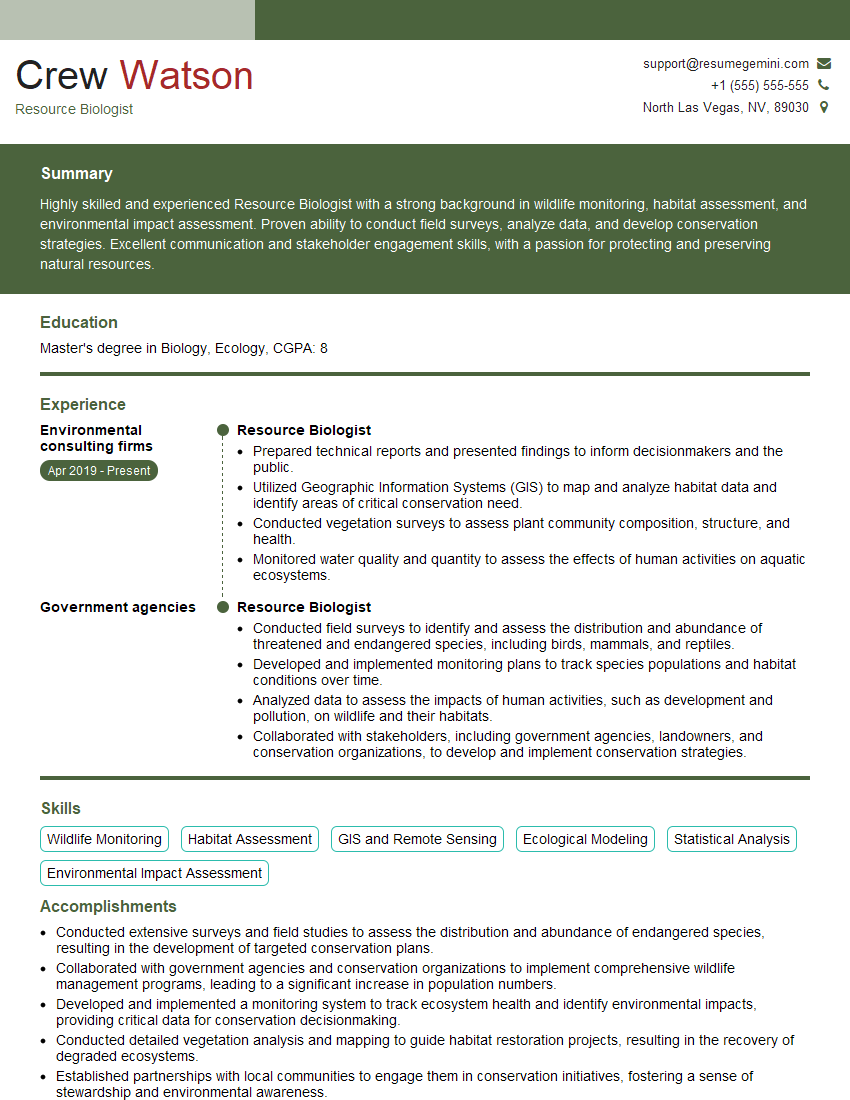Are you a seasoned Resource Biologist seeking a new career path? Discover our professionally built Resource Biologist Resume Template. This time-saving tool provides a solid foundation for your job search. Simply click “Edit Resume” to customize it with your unique experiences and achievements. Customize fonts and colors to match your personal style and increase your chances of landing your dream job. Explore more Resume Templates for additional options.

Crew Watson
Resource Biologist
Summary
Highly skilled and experienced Resource Biologist with a strong background in wildlife monitoring, habitat assessment, and environmental impact assessment. Proven ability to conduct field surveys, analyze data, and develop conservation strategies. Excellent communication and stakeholder engagement skills, with a passion for protecting and preserving natural resources.
Education
Master’s degree in Biology, Ecology
March 2015
Skills
- Wildlife Monitoring
- Habitat Assessment
- GIS and Remote Sensing
- Ecological Modeling
- Statistical Analysis
- Environmental Impact Assessment
Work Experience
Resource Biologist
- Prepared technical reports and presented findings to inform decisionmakers and the public.
- Utilized Geographic Information Systems (GIS) to map and analyze habitat data and identify areas of critical conservation need.
- Conducted vegetation surveys to assess plant community composition, structure, and health.
- Monitored water quality and quantity to assess the effects of human activities on aquatic ecosystems.
Resource Biologist
- Conducted field surveys to identify and assess the distribution and abundance of threatened and endangered species, including birds, mammals, and reptiles.
- Developed and implemented monitoring plans to track species populations and habitat conditions over time.
- Analyzed data to assess the impacts of human activities, such as development and pollution, on wildlife and their habitats.
- Collaborated with stakeholders, including government agencies, landowners, and conservation organizations, to develop and implement conservation strategies.
Accomplishments
- Conducted extensive surveys and field studies to assess the distribution and abundance of endangered species, resulting in the development of targeted conservation plans.
- Collaborated with government agencies and conservation organizations to implement comprehensive wildlife management programs, leading to a significant increase in population numbers.
- Developed and implemented a monitoring system to track ecosystem health and identify environmental impacts, providing critical data for conservation decisionmaking.
- Conducted detailed vegetation analysis and mapping to guide habitat restoration projects, resulting in the recovery of degraded ecosystems.
- Established partnerships with local communities to engage them in conservation initiatives, fostering a sense of stewardship and environmental awareness.
Awards
- Received the Outstanding Resource Management Award for exceptional contributions to wildlife conservation.
- Honored with the Best Research Paper Award at the National Resource Biology Conference for groundbreaking research on ecosystem dynamics.
- Recognized with the Environmental Stewardship Award for implementing innovative and effective conservation strategies.
- Received the Conservation Champion Award for exceptional leadership in promoting sustainable natural resource management practices.
Certificates
- Certified Wildlife Biologist
- Environmental Professional
- Wetland Specialist
- First Aid and CPR
Career Expert Tips:
- Select the ideal resume template to showcase your professional experience effectively.
- Master the art of resume writing to highlight your unique qualifications and achievements.
- Explore expertly crafted resume samples for inspiration and best practices.
- Build your best resume for free this new year with ResumeGemini. Enjoy exclusive discounts on ATS optimized resume templates.
How To Write Resume For Resource Biologist
- Highlight your field experience and technical skills, such as wildlife monitoring, habitat assessment, and GIS.
- Quantify your accomplishments and provide specific examples of your impact on conservation efforts.
- Tailor your resume to each job you apply for, highlighting the skills and experience that are most relevant to the position.
- Proofread your resume carefully for any errors before submitting it.
- Network with professionals in the field and attend industry events to expand your knowledge and stay up-to-date on current trends.
Essential Experience Highlights for a Strong Resource Biologist Resume
- Conduct field surveys to identify and assess the distribution and abundance of wildlife species
- Develop and implement monitoring plans to track species populations and habitat conditions over time
- Analyze data to assess the impacts of human activities on wildlife and their habitats
- Collaborate with stakeholders to develop and implement conservation strategies
- Prepare technical reports and present findings to inform decision-makers and the public
- Utilize GIS to map and analyze habitat data and identify areas of critical conservation need
- Monitor water quality and quantity to assess the effects of human activities on aquatic ecosystems
Frequently Asked Questions (FAQ’s) For Resource Biologist
What is the primary role of a Resource Biologist?
Resource Biologists play a crucial role in the conservation and management of natural resources, including wildlife, plants, and ecosystems.
What are the educational requirements for a Resource Biologist?
Most Resource Biologists hold at least a Master’s degree in Biology, Ecology, or a related field.
What are the key skills and qualities of a successful Resource Biologist?
Successful Resource Biologists possess strong field research skills, data analysis abilities, and communication skills.
What is the job outlook for Resource Biologists?
The job outlook for Resource Biologists is expected to grow faster than average over the next decade due to increasing environmental concerns and the need for conservation.
What are the different types of Resource Biologists?
There are many types of Resource Biologists, including Wildlife Biologists, Fisheries Biologists, Plant Ecologists, and Conservation Biologists.
What are the benefits of working as a Resource Biologist?
Working as a Resource Biologist offers the opportunity to make a real difference in protecting and preserving natural resources.
What are the challenges of working as a Resource Biologist?
Resource Biologists often work in remote locations and may encounter challenging weather conditions.